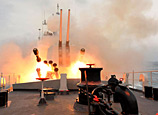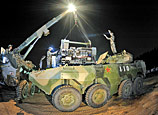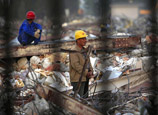
Ren does not lack a sense of romance. There is an old-fashioned wooden train on a lawn at Huawei's HQ. To be precise it is an elegantly decorated train restaurant. Ren likes to entertain guests there.
Anyone who enters Huawei's HQ enjoys a relaxing and free atmosphere, much as one would experience when visiting an Internet company in Silicon Valley. It's a multi-racial community with some employees from partner companies in African countries for whom Huawei provides training.
In recent years Huawei has started to change its method of communicating. At one time it was labeled as a "closed and dangerous" company by Western media. Now it is making a huge effort to change its image on the world stage by inviting reporters to visit its headquarters, disclosing financial figures and arranging high-level management interviews.
Media debut
Ren, 69, had never previously spoken to any media on the record, but he gave his first-ever news briefing to four New Zealand media representatives in Wellington in early May.
It came after New Zealand's biggest telephone company, Telecom Corp, awarded Huawei a contract to build its new nationwide wireless network. Huawei was also chosen as a core supplier in 2011/2012 for New Zealand's ultra-fast broadband initiative.
"New Zealand is one of Huawei's most important strategic markets and is very valuable to us," said Ren in a statement.
Huawei entered New Zealand in 2005 and now employs 120 people there.
Ada Qin, a senior editor at Forbes China, said when Huawei encountered severe opposition after bidding for contracts in the United States and in Australia, New Zealand's support meant a lot to the company.
In 2012, Australia cited national interest concerns when it banned a Huawei unit from tendering for contracts linked to the nation's A$36 billion ($38 billion) broadband network.
"The South Pacific region contributes a small share of sales to Huawei but it is critical in Huawei's fight against US opposition," Qin wrote in a Chinese analysis article.
According to Huawei's 2012 annual financial report, the Chinese and European markets accounted for about two-thirds of Huawei's total revenues. Huawei has developed relatively stable cooperation with these markets.
However, the US influence is powerful and imposes pressure on other swaying countries. The South Pacific market is targeted by US influence, Qin said. "The Australian market is important to Huawei's global ambitions. If Huawei gives up there, it may be a very damaging situation for the company."
Ren frequently turns down interview requests, both at home and abroad. His low-profile approach make many suspicious about him and his company. Given his Chinese military background, US politicians, among others, often cite Huawei as a possible threat to national security.
In 2010, the then US commerce secretary Gary Locke warned Sprint Nextel Corp against awarding Huawei part of a contract worth billions of dollars. Locke called Sprint CEO Dan Hesse directly to remind him of the US government's security concerns, according to a report in The Wall Street Journal.
The latest obstacles faced by Huawei include a US Congressional report last year that said Huawei and ZTE Corp, another Chinese telecom infrastructure provider, posed a threat to the country, citing concerns that their equipment might be used to spy on the US. Both companies strongly denied the allegations.
In Europe, meanwhile, the European Commission has been considering whether to start an investigation into allegedly unfair trade practices by Chinese companies including Huawei. Because of this, Huawei has been barred from doing business with major US telecom carriers.


















 Three injured in plane's failed take-off in NE China
Three injured in plane's failed take-off in NE China


![]()
